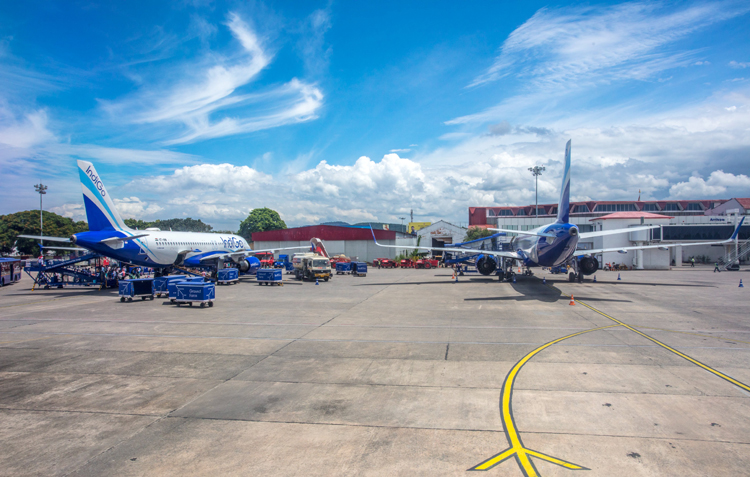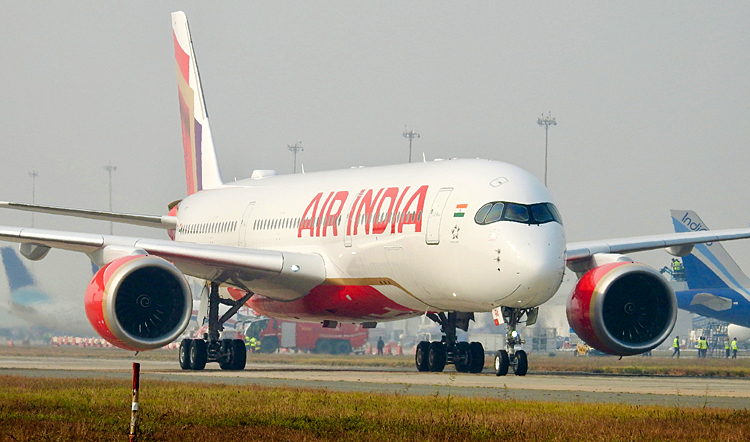India amends leasing bill to boost global lessors' confidence in Indian market
The bill aims to establish a legal framework that safeguards the interests of global lessors in the Indian Aviation market

Aircraft leasing has always been a debatable subject in India, that's because although India signed the Cape Town Convention (CTC) in 2008, it was not ratified by the Indian Parliament due to which CTC's provisions were not legally binding in India. Now the question arises why was the CTC not ratified in India? "The Bill has been in the discussion for a long period," says Ajay Kumar, Managing Partner, KLA Legal. However, he cites that the primary reason for the delay was mainly due to consultations with various stakeholders as the ACT had to cater to the needs of various players including the lessors, lessees, airport operators, tax authorities et al. "All this led to multiple rounds of discussions and meetings," Kumar adds. "However, it is better late than never! Kumar says heaving a sigh of relief.
India did indeed amend certain domestic laws after acceding to the Convention, however while these were very welcome, they were inadequate in case of any other Indian law which would conflict with the Convention. Nitin Sarin, Managing Partner at Sarin & Co goes on to explain with an example. "One example is pertaining to export, Indian laws pertaining to export of aircraft are opposed to the Convention, which may be resolved once the Bill is passed."
By reducing the risk for lessors, the legislation is expected to lower leasing rates, which could eventually translate into more affordable airfares for consumers
"The delay can be attributed to the complexities involved in aligning domestic laws with international conventions and the need for thorough consultations with various Ministries to ensure the bill's effectiveness and acceptance," adds Sarin.
"While the ministries would have a clearer idea of the timeline, I imagine that the delay stems from the complexities of harmonising multiple Indian laws, such as the Companies Act and the Insolvency and Bankruptcy Code, with the provisions of the Cape Town Convention," debates Jaideep Mirchandani, Chairman of SkyOne Group. Each law operates within a specific framework, and integrating them under a unified statute required careful consideration to avoid conflicts, hence the unfortunate delay. "Nonetheless, the bill has now been approved and is proof of the government's commitment to addressing long-standing challenges and creating a more business-friendly environment," Mirchandani further asserts.
How will the Bill benefit Indian aviation?
"The bill, if in a form which is favorable, will enhance the confidence of global lessors in the Indian aviation market by providing a legal framework that protects their interests," says Sarin. This will likely lead to increased investment in the sector, fostering growth and modernisation of the Indian aviation industry. "It is important to remember, however, that implementing this law is important but properly applying it in practice is essential," Sarin warns.

Calling the bill a great step towards making the Indian aviation industry at par with best global practices, Mirchandani adds that the bill addresses the worries of international lessors and integrates the domestic laws with the Cape Town Convention such as to create a reasonable legal system which serves their interests.
These changes will induce comfort to lessors who are scared to lease aircrafts to Indian airlines due to unnecessary legal tussles and guarantee the continuous supply of modern aircrafts that are necessary for the development of aviation in the country. "As the nation's set sights towards growth in the industry, this will reduce the costs of leasing, give access to advanced fleets, and most importantly, foster the long-term development of the industry," Mirchandani further adds.
So, what happened in case of a dispute?
In the absence of an act of Parliament that ratifies the Cape Town Convention, lessors and other creditors faced significant risk in case of a default as there was no clear path to repossess the aircraft. Currently, the moratorium under India's insolvency rules brought to a sudden halt any recovery efforts being made and also blocked the lessors from repossessing aircraft for a significant period.
By the time the dispute was settled and the lessors got the procession of their aircraft, chances are the aircraft had already lost its value or it might be trapped in some legal dispute making it further difficult for the lessor to take back their asset. All of this had created a general perception in the global industry that India is a risky jurisdiction for lessors.
Due to this leasing companies charged higher lease rentals to compensate for the risks involved in case of bankruptcy resulting in increased operational costs for the airlines, leading to increased air fares thus putting a burden on the passenger.
The bill is designed to streamline the repossession process for aircraft in cases of airline bankruptcy, addressing legal uncertainties and delays
The Protection and Enforcement of Interests in Aircraft Objects Bill will guarantee lessors rights to repossess their leased asset (aircraft/engine etc) and at the same time ratify the Cape Town Convention. With the lessors' rights safeguarded under the Act, the leasing rates will come down gradually reducing the financial burden on airlines and finally leading to reduced air fares. "Passage of the bill will make India eligible for the OECD discount. Indian operators will, therefore, need to pay lesser risk premiums which may result in cheaper lease rentals," says Kumar. "By reducing the risk for lessors, the bill is expected to lower leasing rates," Nitin Sarin, Managing Partner, Sarin and Co, seconds' Kumar's views. "This reduction in costs can eventually be passed on to consumers in the form of lower airfares, making air travel more affordable and accessible," adds Sarin.
The bill is expected to offer clear procedures for the repossession of aircrafts in case of payment defaults, and as such, it will help to lower lessors' premiums and deposits. That way, lower premiums will help free up fund to serve as lower operating costs for the national carriers that will result in lower fares for air travels and for cargo airlines. "There is no doubt, this is a win-win for both the carriers and the travelers as it stimulates air transport accessibility, stimulates economic growth through e-commerce, and increases airline profits," adds Jaideep Mirchandani, Chairman of Dubai-based SkyOne Group.
At present, the majority of commercial aircraft in India are leased.
What is CTC and Why has India not ratified the CTC yet?
The CTC was adopted at a diplomatic conference in Cape Town in November 2001 under the auspices of the International Civil Aviation Organization (ICAO) and the International Institute for the Unification of Private Law (UNIDROIT). Although India is a signatory to the convention, Indian Parliament has not ratified the CTC yet. Due to this unique situation, local court's judgement mostly holds precedence over the norms of the convention.
To avoid this, an inter-ministerial consultation process was initiated last year to revise the Bill.
This Bill comes on the backdrop of the recent Go First bankruptcy crisis. Go First filed for bankruptcy in May 2023, citing significant financial distress attributing it primarily to engine supply issues from Pratt & Whitney, which led to a substantial number of grounded aircraft and consequent revenue losses. At the time of filing, Go First's total debt to financial creditors was approximately ₹6,521 crore, with over ₹2,600 crore owed to various aircraft lessors.
Strengthening protections for creditor interests and minimising legal ambiguities, the bill is expected to improve India's credibility in global aviation and business rankings
Following the bankruptcy filing, the National Company Law Tribunal (NCLT) imposed a moratorium on Go First's assets thus preventing lessors from repossessing their aircraft. This led to a widespread panic amongst the lessors regarding the challenges of asset recovery in India during insolvency proceedings.
"We all witnessed the long duration of bankruptcy related moratorium in the Go First case," adds Kumar. He further goes on to explain the entire process and how led to the delay. "The moratorium period under the Bankruptcy code can run for a period nine months. In certain cases, it may go beyond that period as well. With a view to address such issues, the Ministry of Corporate Affairs published a Notification on October 3, 2023 which provided that moratorium will not apply to transactions, arrangements or agreements under the Cape Town Convention relating to aircraft, aircraft engines, airframes and helicopters. After the enactment of the said Act, the moratorium period is expected to be governed by India's declarations under the Cape Town Convention which opts for Alternate A of the Protocol to the Convention. This may mean that in a bankruptcy related event, the owner/ creditors should get the possession of their equipment after 60 days. The bankruptcy proceedings can of course continue till its conclusion," explains Kumar.

"The bill will streamline the process of repossessing aircraft in the event of an airline's bankruptcy, reducing legal uncertainties and delays," adds Sarin. Speaking on the recent Go First case, Sarin says that the bill would have facilitated quicker resolution and asset recovery for lessors. "It must however be mentioned that as far as insolvency goes, the Government already passed a law on October 3, 2023 removing aircraft and engines to which the Convention applies, from the purview of the Insolvency and Bankruptcy Code, 2016," Sarin adds. The Act may however be a small step backwards as it will possibly allow the Resolution Profession to hold on to the aircraft or engine for a few days (with payment).
Agreeing with Kumar and Sarin, Mirchandani states that with this bill, lessors will not encounter steep wait times or potential loss of their planes. "This minimises their risk exposure and incentivises them to keep leasing to Indian airlines which is good for the aviation sector," Mirchandani adds.
In response to this the Aviation Working Group (AWG) downgraded India's compliance rating under the Cape Town Convention (CTC), citing difficulties faced by lessors in reclaiming their planes from Go First. To address this and to bolster the confidence in global leasing community, Indian government proposed the Cape Town Convention Bill. The Bill aligns India's domestic laws with the CTC's provisions and ensures that the lessors can repossess their aircraft in a timely manner during insolvency proceedings. "Thus, the bill will of course improve India's global ranking as India will become a low-risk jurisdiction," says Kumar positively. Enactment of this Act will significantly improve India's CTC compliance index published by the AWG. Seconding Kumar's opinion Sarin adds, "Yes, implementing the Cape Town Convention is likely to improve India's global ranking in terms of ease of doing business and attractiveness as an investment destination, particularly in the aviation sector." Everyone's eyes will be on how Indian authorities implement the new Act. "Also, the general public has not seen a copy of the Bill yet so the success of the same is all based on conjecture at the moment," Sarin further adds.
With India becoming a lower-risk jurisdiction for lessors, the bill is anticipated to encourage increased leasing activity, supporting the growth of the country's civil aviation sector
The Bill in all fairness will give primacy to CTC over conflicting domestic laws, particularly the IBC and seeks to establish a moratorium period of 40 days for aircraft repossession, shorter than the global standard of 60 days.
Thus, the bill addresses the concerns raised by the Aviation Working Group (AWG) regarding India's adherence to international leasing norms- a step in the right direction. "By demonstrating that India is serious about protecting creditor interests and reducing legal ambiguities, the bill enhances India's credibility which is more important from a business perspective, but potentially yes, it may improve its ranking in global aviation and business indexes," Mirchandani concludes.
The IBC backgrounder – The Insolvency and Bankruptcy Code (IBC) was introduced in 2016 by the Central government to resolve claims involving insolvent companies. However, it lacked a comprehensive framework for pre-packaged insolvency leading to delays and uncertainties.
With the new bill, the centre will be empowered to make the necessary rules for implementing the convention and protocol in India. The Indian industry has welcomed this long-awaited decision with open arms. Calling this bill as a game-changer for Indian aviation, Ajay Kumar, managing partner at KLA legal says that, once enacted, India will become a Cape Town compliant jurisdiction thus bringing uniformity in the aviation laws. "From a lessor's perspective, India is expected to become a low-risk jurisdiction and would encourage the lessors to lease in more assets to Indian operators providing a much-needed boost to the Indian civil aviation market," Kumar adds.
The implementation of the Cape Town Convention in India will mark a significant milestone for the aviation industry and is a welcome move by the government. Various stakeholders were keenly waiting for this historic step in the civil aviation sector. This is, however, the first step in many steps that are required. If applied right, it has the potential to unlock the power and money of many investors around the world who have ceased leasing or financing more aircraft in India due to having reached their maximum exposure.
Moreover, the bill is expected to eliminate legal grey areas and solidify India's position in the aviation arena. This will help not only in reducing the cost of leases for airlines but will also help invites more foreign investment which will help the industry grow and remain sustainable in the long run. It sends a good message to the international community that India is open for business and willing to adopt international standards.
"I have been involved with multiple meetings at various levels to discuss and finalise the text. As a practicing aviation lawyer, I am glad to see the positive movement and hope that the bill will be enacted into a law sooner," Kumar concludes.





